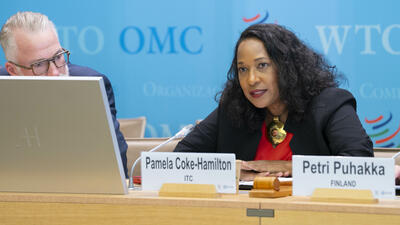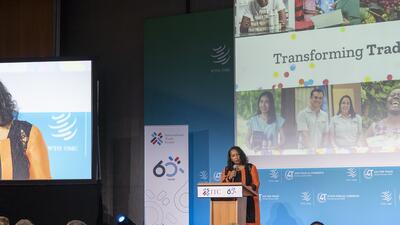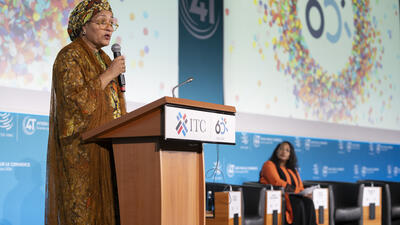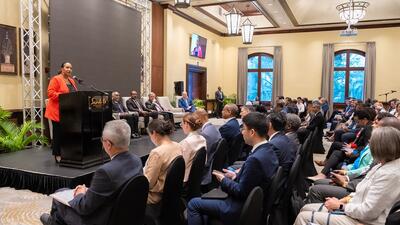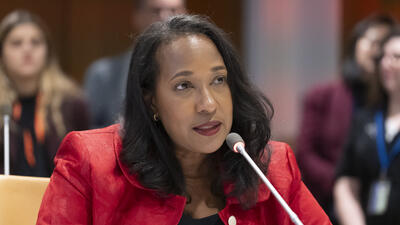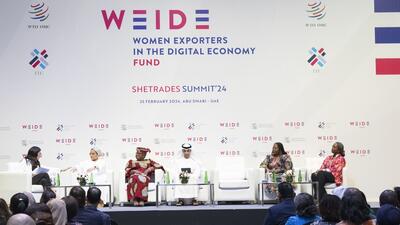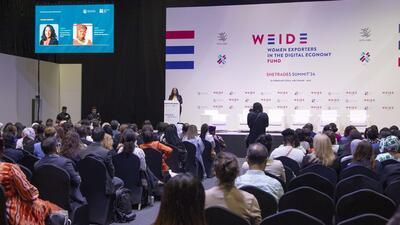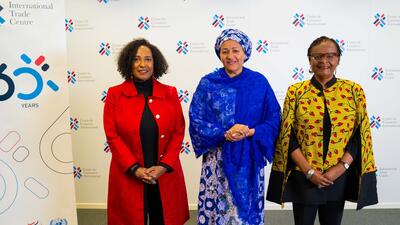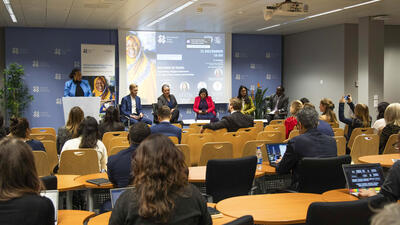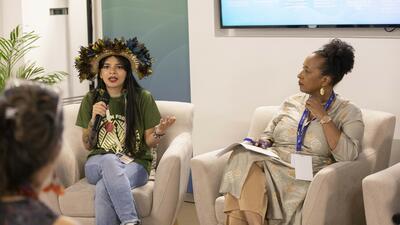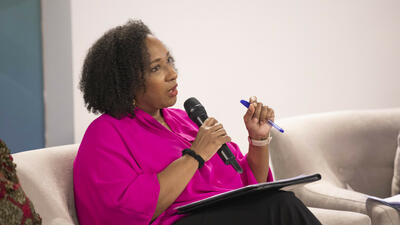
ITC Executive Director’s Statement at the 56th Joint Advisory Group
Chairperson Usha Canabady of Mauritius, Director-General, Secretary-General – and let me say what a delight it is, in this sometime very male world of trade diplomacy, to acknowledge three other women on the podium – dear friends,
I’d like to start by thanking the Netherlands for chairing the 55th session of the JAG. Ambassador Bekkers, you have been the very model of the JAG Chair during this last year, reporting on our activities and results to our wider membership in Geneva. The Netherlands has been a critical supporter of ITC for so many years. Thank you for your dedication and your partnership.
I’d also like to thank you, Ambassador Canabady, for accepting to chair the 56th JAG. I can’t think of a better person to steer the JAG ship this year than the current Chair of the WTO Committee on Trade and Development – our docking point within this house – and someone who understands the challenges facing an African Small Island Developing State.
Thanks to you both, DG and SG, for providing our joint UN and WTO identity. The moral compass of the Sustainable Development Goals and the guiding vision of the Bridgetown Covenant. The rights and responsibilities of the WTO Agreements, given fresh energy by the MC12 “Geneva package”.
I want to take this opportunity to congratulate the DG, her staff and the WTO members for having secured that outcome in June. As many of you know, I was a former delegate to the GATT. I remember those late-night sessions in Room W. The eternal group coordinating sessions and last-minute calls to my capital. The difficult choices, the fear of it all falling apart and the joy when it all came together.
To DG and SG, I want to say thank you to you and your staff for your cooperation and hard work on our shared Geneva trade hub initiatives. Tools like the Global Trade Help Desk, that bring transparency and trade opportunity to exporters around the world. Our shared work in areas from TBT to trade facilitation, and from rules of origin to the Route du Coton.
Last year, I stood before you at the Palais and spoke about the human development crisis – one of almost unimaginable proportions – that had been unleashed by COVID. Not just the economic crisis and the millions of jobs lost. But the health crisis and lives lost. The lockdowns and years of learning lost.
All this at a moment when trade volumes had seen their largest-ever one-period decline in trade. Where countries like my own faced losing revenues from a third tourist season. Where impacts from climate change were turning from prediction to reality.
I’ll be honest: I’d really thought at that time that we were, globally speaking, at a low point. I thought that after so much human suffering at a global scale, it couldn’t possibly get any worse.
Well, was I wrong. What was a crisis of two C’s – COVID and climate change – has become a crisis of four C’s: COVID, climate, conflict and cost-of-living.
DG, SG and I wrote a joint op-ed only a few weeks ago. The Four-C crisis was the starting point. In that op-ed – and let me quote directly – we said:
“We are in the toughest period the world economy has faced since the creation of the multilateral system more than three-quarters of a century ago.
Countries that had seemed on track to prosperity and stability now stare into the abyss of debt distress, fragility and uncertainty about the future.”
I believe that taking meaningful action begins with a realistic appreciation of where we are now. And where we are now is a very complex, uncertain world. Let me just cite a few statistics and anecdotes that illustrate, for me, the scale of the challenge.
First, according to the UNDP Human Development Report released just last week, the Human Development Index has declined two years in a row. For the second year running, the world stopped making progress in the SDGs. As the report says, we are facing a “tailspin in global human development”.
Second, I was travelling in my own home region over the last few weeks. I saw a newspaper article that said that – due to rising food prices – many families now find it cheaper to eat out, often on not very healthy food, rather than cook fresh meals at home. One can only imagine the impact that will have on non-communicable diseases and general well-being, especially for children.
Third, anyone who has seen the awful images from Pakistan can appreciate the scale of devastation from climate change. How – like a hurricane in my own region – it can wipe out not only lives and homes but an entire export infrastructure.
Let me point out that I am – by nature – an optimist. I think it comes with growing up less than hour from the beach.
But amidst all of these problems, with these dark clouds hanging over us, there is – I think – a silver lining. Two in fact.
The first is that – despite growing budgetary pressures in many of our funder countries – the international community still believes in us, and in our work. During the Global Review in July, OECD data showed a record high of nearly $50 billion in aid for trade disbursements. Half were either climate or gender related and one-third supported the digital economy. This is a hugely important vote of confidence in the work of the Geneva trade hub and our partners around the world.
The second silver lining is that the four-C crisis only makes our work more, not less, important.
- When climate change hits harder every day, small businesses need incentives and tools to go green.
- When COVID is still causing lockdowns for millions, small businesses need support to stay afloat and protect their workforce – especially women, young people and the most vulnerable.
- When conflict disrupts supply chains, small businesses need even better market and trade intelligence to find new inputs and routes to international markets.
- When the cost of living skyrockets for families everywhere, small businesses need to be even more competitive, have access to even better financing, to keep the costs of their products and services affordable.
So this is where we are now. All of us here – particularly those blessed to be working within multilateral agencies – we all need to step up. The world is watching and waiting for us to deliver. To avoid resting on our laurels. To double down on development and create a more sustainable, connected and inclusive future.
That’s why I’m proud to present our Annual Report for 2021 to you today. It may seem odd to pivot from a passionate call to action to a corporate document. But I think part of our new reality is a recognition that – as people and as organizations – we will be judged not by what we say in speeches or social media, but by what we do and what we deliver. And I’ve never been prouder of what ITC has done and delivered in a single year.
Last year, ITC helped our partners chart a roadmap to recovery. Our project delivery and development results gave fresh energy and impetus towards the SDGs, at a time when so many MSMEs were struggling simply to keep the lights on, orders filled and people on their payroll.
We stayed agile and innovative, recognizing that the market opportunities, financing needs and competitiveness of our beneficiaries – especially those at the base of the pyramid – keep changing.
One of our key milestones last year was the launching of our new Strategic Plan for 2022 to 2025.
Over the next four years, we will keep delivering trade that is sustainable, inclusive and transformative. Trade that puts the SDGs back on track. Thank you again for your inputs and engagement during the process of crafting and validating the Strategic Plan.
One of the great things about being ITC ED is that I get to present a lot of pretty eye-popping statistics. And once again, in 2021, we surpassed many of our targets. For example:
- We had nearly 10 million visits to TradeMap, more than 12 thousand monthly visits to Export potential map and logged 85 thousand users of our joint Global Trade Helpdesk.
- We provided more than five thousand days of trainings to our project beneficiaries, including to nearly 120,000 participants in our SME Trade Academy.
- Thanks to ITC interventions, more than 25,000 MSMEs have improved their competitiveness, with one-fifth having improved their environmental performance.
- Through our South-South trade and investment programme, we facilitated over 90 million dollars in trade and investment deals.
Last year, I told you that we were on track to meet our ambitious goal of connecting three million women to market. Today, I can confirm that we have met that goal and we are still pushing forward to connect not only more women but do it in a deeper and more meaningful way.
In 2021, we continued focusing on our core mission: helping small business go global and contribute to the SDGs. We maintained our focus on the constituencies and communities most in need, particularly women-owned businesses, young entrepreneurs and vulnerable communities.
We exceeded our 80% target for delivery to our priority countries – namely, least developed countries, landlocked developing countries, small-island developing States, conflict-affected countries and sub-Saharan Africa.
Every ITC Annual Report is full of great stories from our work in nearly 130 countries. Let me share a few to illustrate what we do and why we do it.
The first is our flagship report, the SME Competitiveness Outlook or SMECO.
In a year when the reality of climate change hit home for millions across the globe, our 2021 SMECO focused on empowering the green recovery.
Our SMECO 2021 looked at how green measures could offer MSMEs new business opportunities, increase their competitiveness and lower their vulnerability to climate risks. It laid out clear, actionable recommendations under a “Green Recovery Plan”.
As I take part in COP27 in November – bringing the voice of trade, the private sector and MSMEs into the climate debate – I’ll be carrying the key messages of SMECO 2021 with me to Sharm El Sheikh.
As an aside, I’ll be launching the 2022 SMECO at the WTO Public Forum later this month. This year’s theme is on Connected Services, Competitive Businesses. We hope to see you there.
The second is our work on formalizing small-scale cross-border trade in West Africa.
Through our work, we see how informal trade – often done by women, in small shipments, and in difficult conditions – helps to move food and essential goods across what are often food-insecure and vulnerable border communities.
That’s why our teams, working with private sector associations and national governments, supported by several donors present here today, have established trade information and border assistance offices at key border points across West Africa.
We gave them state-of-the-art facilities and a tailored capacity-building programme, focused on making these facilities work for small-scale cross-border traders.
This work, we believe, will not only help so many cross-border traders formalize their work and enjoy better lives. It will also improve transparency across the region, support trade corridors and boost the African Continental Free Trade Area from the ground up.
The third story is from our FastTrackTech programme, which is generously supported through the fifth iteration of the Netherlands Trust Fund.
At a time when the digital revolution continues to upend entire industries, ITC supported MSMEs and tech start-ups with everything from matchmaking and coaching to export plan development and investor pitching.
And the results are impressive. Our client start-ups raised 5.4 million dollars in total investment. In Cote d’Ivoire, we supported a payment solutions company called CinetPay to successfully raise a first round of funding.
This is a firm that today – five years after its founding – employs 70 people in nine African countries and has processed transactions worth more than 30 million dollars.
The fourth story is from our work on sustainability standards, in this case for clothing.
The numbers, again, are staggering. It’s an industry that generates revenues of 3 trillion dollars and employs up to 75 million people worldwide. But while clothes are a part of our everyday lives, it’s also an industry that has struggled with the increasing demands for transparency and traceability along its value chains.
That’s why our T4SD team partnered with UN ECE, the ILO and the World Bank Group – with generous support from the European Union – to develop and implement a ‘track and trace’ platform. The platform helps companies reduce the cost of sustainability audits, so that they can focus on improving the working conditions in their garment and footwear facilities.
On the back of ITC’s work – which leveraged our Sustainability Map platform – more than six thousand garment factories in 56 countries have generated, collectively, an estimated 10 million dollars in savings.
These are just four examples of ITC’s excellent work during 2021 and there are many more.
It goes without saying that we could not have achieved any of this without the support of our funders.
I want to take this opportunity to acknowledge each individually: Australia, Belgium, Canada, China, Denmark, the European Union, Finland, France, Germany, Iceland, India, Ireland, Japan, Korea, the Netherlands, Norway, Sweden, Switzerland, the United States, and the United Kingdom – and let me reiterate my deepest condolences to Ambassador Manley and his team following the death of the Queen.
We are also proud that some developing countries are also reaching out to ITC to obtain our services which they fund themselves, such as Bhutan and Curacao.
Of course, none of this would have been possible either without your support through the ITC regular budget, and here I’d like to thank the entire WTO and UN membership for their faith in ITC.
While we might all live in the so-called “Geneva bubble”, none of us works in isolation, especially when we want to deliver at scale. So let me also recognise the generosity and commitment of our many sister organizations – those at the WTO and within the UN family, plus those based in our priority regions and countries – as well as our many private sector partners.
There’s a reason why the section in the Annual Report listing all of our funder and partner organizations goes on for three pages. We’re proud of our partnerships and our ability to serve clients across the private and public worlds.
It’s part of our commitment to the UN Secretary-General’s call for a more coherent and impactful UN Development System. It’s a commitment that recognises that for a small business in Burkina Faso, or a coconut farmer in Barbados, or a trade official in Uzbekistan, there aren’t silos and mandates. There are just problems that need to be solved.
Our commitment, our track record and your support mean that ITC’s finances are on solid footing, at a time when governments are having to make hard choices about their aid budgets and their trade relationships.
In 2021, we delivered around 150 million dollars, across our regular and extra-budgetary funding, through nearly 130 projects – a record. We signed nearly 95 million dollars in new funding agreements.
Last year, we received 14 million dollars in unearmarked and soft-earmarked contributions to Window 1. These funds allow us to keep many of our global public goods free for stakeholders. They allow us to remain innovative and push our business model even further. They allow us to pilot new initiatives that – over time – can become bankable, investible projects in their own right.
Behind the financial figures, behind the statistics on delivery, are two things.
The first is your trust in ITC’s management and strategic priorities. I want to thank you – the WTO and UN members – for that trust.
The second is the hard work, dedication and creativity of my staff. Their commitment to the cause of trade and development – to making aid for trade work for everyone in a practical, impactful way – is humbling and energizing.
This morning, I’ve spoken to where we’re at. I walked us through where we’ve been. Let me close by giving you a glimpse of where we’ve going.
At the last JAG, I told you that over the period of this new Strategic Plan, I want to transform what the ITC does and how we do what we do. I want ITC to become even more impactful and results-driven.
I want ITC to tackle the big structural problems that hold developing countries back. To paraphrase Desmond Tutu, I want us to not just pull people out of the river. I want our projects and initiatives to go upstream and find out why those people are falling in.
That’s why, this year, I launched four moonshots. Four “big pushes” on gender, green, youth and digital connectivity. Deliberately named after the original moonshot that was launched just three years before the birth of UNCTAD and ITC.
The idea behind the moonshots is to take an honest, critical look at our offer in these four areas. To celebrate our wins and address our weaknesses. To look – like any business might do – at the entire internal value chain that underpins ITC delivery in these areas and understand where we need to collaborate more efficiently.
Then – with the resources generously provided by our funders – to take our offer in these areas to the next, transformative, level.
We spent the last six months defining the scope of these moonshots. The rest of this year will be focused on taking the first steps in implementing the new vision.
On gender, we will prioritise scaling up our platforms including SheTrades for global reach while targeting a wider cross section of women and value chains. We’ll bring our policy and advocacy toolbox to sector that can be transformative for women, such as gender responsive public procurement.
On green, we will advocate by placing the MSME voice on the global sustainability agenda. We’ll assess through even better analysis and tools on climate change risk, market barriers and opportunities. We’ll act to improve the climate competitiveness of MSMEs.
On youth, we’ll focus on sectors that we feel can really unlock the potential of young people in trade, namely tech, agri-business and sports. We’ll take a fresh look across the board at our Hubs and Accelerators to make them provide even better services to young entrepreneurs.
And on digital connectivity, our new “SWITCH ON” initiative will push our global advocacy on digital issues to the next level. We’ll create new partnerships on issues like broadband connectivity and the inclusion of the digitally disadvantaged.
The moonshots will, I strongly believe, ensure that ITC is fit for purpose for the more complex, challenging and interdependent world that is not just coming but already here.
This year, we’ll keep moving forward on our resource mobilization, especially during this critical period when funders are programming for the medium-term and difficult budgetary choices are being made. We’ll keep working on our internal business processes so we remain match-fit for the ever-more complex development environment we are working in.
We’ll keep working on our strategic planning, governance and risk management – you’ll hear more about this from my colleague Miguel during his presentation of our Annual Evaluation Synthesis Report. And we’ll keep leading the way within the UN system on equality, diversity and inclusion.
I know: it’s a lot for any organization to deliver. But looking back, I know we can. And looking around, I don’t think we have a choice.
I opened mentioning the unimaginable devastation of climate change in Pakistan, so let me close there.
One of our beneficiaries – Hafiz Bijjar, who exports top-quality dates from his home district – wrote to us this weekend. He told us how the rains had destroyed one third of his crop, with the remaining two-thirds literally hanging by a thread. Along with the livelihoods of so many small businesses, farmers and suppliers that are part of his supply chain.
Under our GRASP programme, funded by the EU, Hafiz applied for an expedited grant. It will allow him to salvage a large share of his product intact. To package and transport his prize dates despite transport and road blockages.
In his own words: “My only concern is to continue my business. Getting the ITC grant at this stage is a godsend”.
That’s why we do what we do.
I’d like to close by quoting Theodore Roosevelt: "It is not the critic who counts; not the man who points out how the strong man stumbles, or where the doer of deeds could have done them better. The credit belongs to the man who is actually in the arena, whose face is marred by dust and sweat and blood; who strives valiantly; who errs, who comes short again and again, because there is no effort without error and shortcoming; but who does actually strive to do the deeds; who knows great enthusiasms, the great devotions; who spends himself in a worthy cause; who at the best knows in the end the triumph of high achievement, and who at the worst, if he fails, at least fails while daring greatly, so that his place shall never be with those cold and timid souls who neither know victory nor defeat."
Thank you.




